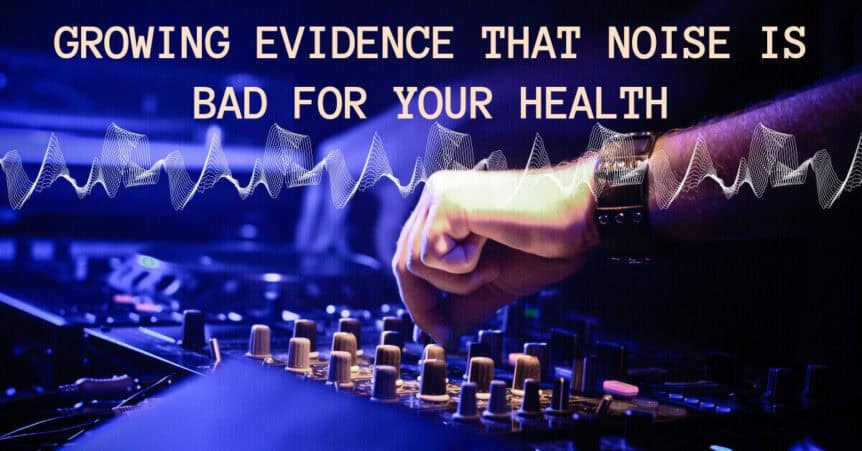- The Emotional Journey of Accepting Hearing Loss - October 25, 2024
- Making a Style Statement with Hearing Aids This Fall - October 15, 2024
- Fireplace Safety and Hearing aids - October 4, 2024
Evidence has already demonstrated that noise can be detrimental to your hearing health, with the potential to cause permanent noise-induced hearing loss. Researchers are now looking at the ways in which high levels of noise can affect your physical and mental health as well. As we move through busy city streets or work on DIY construction projects at home, the effects of noise and loud sound can be devastating to peace of mind for many people. Some feel more frustrated and annoyed by the sounds they encounter, while others can become removed, isolated, and withdrawn. Some may even feel reticent to leave the house, knowing that noise will be a bothersome aspect of any excursion away from home. Some also have health conditions that make them particularly susceptible to noise, such as migraine headaches. These headaches can be exacerbated by noise and loudness, literally translating sound into pain.
Studying Noise Pollution
Recent guidelines by the World Health Organization (WHO) have documented health effects of noise pollution that go beyond mental discomfort. Noise pollution is the presence of sound that has a negative effect on humankind, and it can take many forms. In comparison with other forms of pollution, such as industrial waste, litter, and gaseous emissions, noise pollution has a direct effect on the ability of homo sapiens to thrive on this planet. Just as those who are exposed to pollution of other kinds may be subject to health problems, such as asthma, respiratory problems, and even cancer, so can noise pollution have a detrimental effect on physical and mental health. Let’s take a look at the recommendations and guidelines set by WHO regarding this often-overlooked form of pollution.
Stephen Stansfeld, professor of psychiatry at Queen Mary University in London, completed a metadata analysis of eight different studies of the effects of noise pollution on health. This study contributed to the WHO’s understanding of the point at which noise becomes a real problem for human health. In the past, WHO has set acceptable levels of noise emissions by passenger aircraft, rail, and roadways. Each of these modes of transportation can cause discomfort and annoyance for those who travel on them, as well as residents nearby these thoroughfares of the land and air.
WHO has documented shocking health effects of exposure to noise from these sources, including increased risk of abdominal obesity and diabetes. It is difficult to disentangle these conditions from the other surrounding variables that may be confounding the effects of noise, yet the negative effects in terms of mental health are clearly stated. Road traffic noise has been associated with an increased risk of heart attack, although prolonged stress may be the intervening variable in the explanatory model.
In the latest recommendation and set of guidelines, WHO has added two new categories of noise pollutants: wind turbines and “leisure noise.” In the first case, the data is still coming in regarding the negative health outcomes. Indeed, many who live nearby these units or wind farms report annoying sounds, and there is mounting evidence that they may inhibit the ability to get restful sleep. They emit low-frequency audio, and reports by residents nearby wind turbines may be skewed due to their otherwise negative association with the machinery.
Leisure noise, on the other hand, has a more clearly identified effect on health. The puzzling piece of this type of pollution is that individuals willingly subject themselves to this kind of noise, and it will be difficult to intervene at a governmental level. Loud noise from nightclubs, pubs, fitness classes, live sporting events, and concerts or live music venues can have drastic effects on the ability of listeners to hear. Beyond these effects on individuals, many worry about the hearing health of employees at these venues. Neighboring residents may even be affected in some cases. These locales may cause tinnitus, or ringing in the ears. Other mental symptoms are associated, as well, including mental stress, annoyance, and frustration. Perhaps the most detrimental source of leisure noise is headphones, including earbuds that are inserted into the ears and played at literally deafening volumes. Though the incorporation of World Health Organization guidelines into European policy is one step forward, the rest of the globe can benefit from similar consideration of the negative health effects of ongoing exposure to noise pollution.
Visit Us at New Leaf Hearing Clinic
Are you concerned about your hearing abilities? At New Leaf Hearing Clinic, we provide comprehensive hearing testing. If a hearing loss is detected, we will work with you to find the best hearing solution to meet your needs. Contact us today to schedule a consultation.

